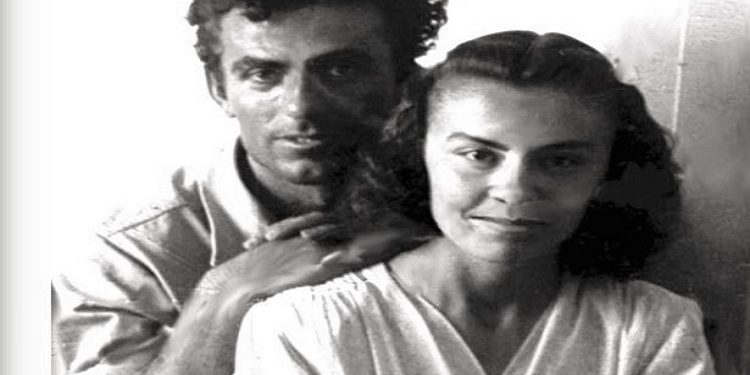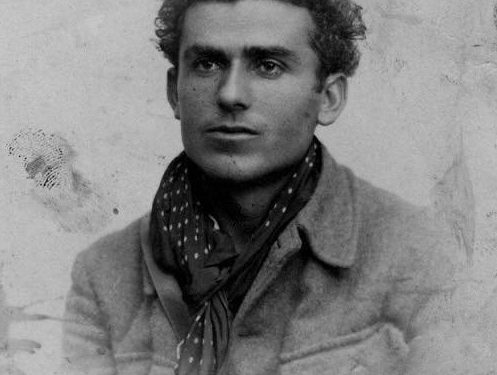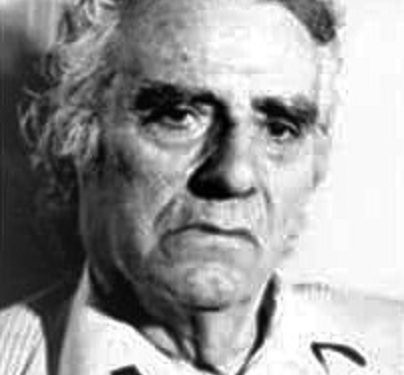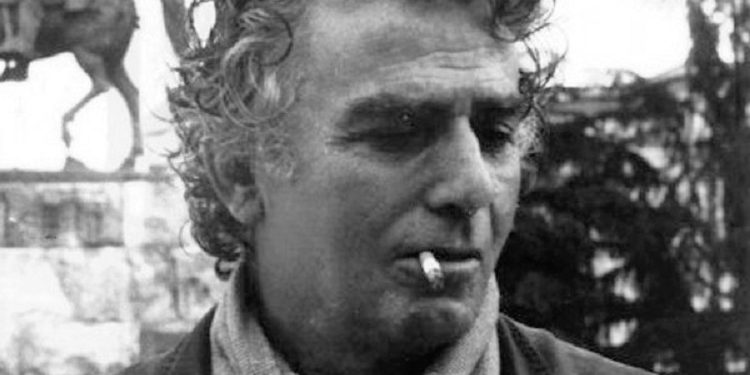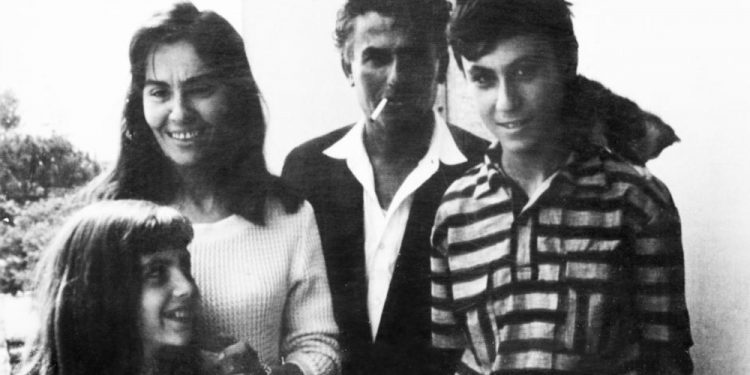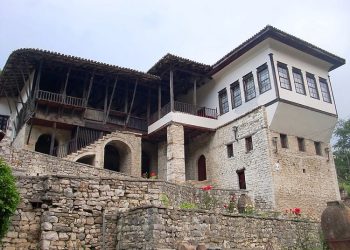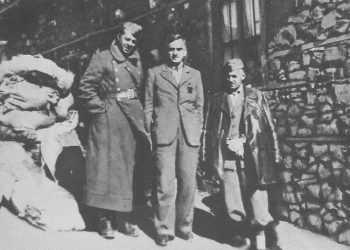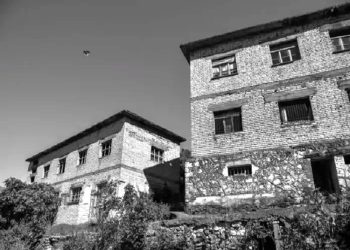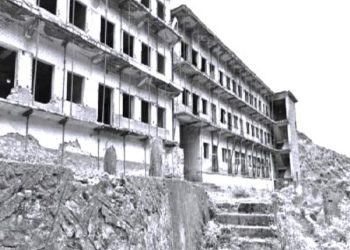By Petro Marko
The sixth part
Memorie.al / The confessions of the well-known writer Petro Marko, former fighter of the Internationalist Brigades in the War of Spain in 1936, and then also of the anti-fascist resistance in Tirana, shows the behind-the-scenes of what is known as the National Liberation War and why Koçi Xoxe hated Enver Hoxha?! Sejfulla Maleshova’s order: “This is a terrorist party; don’t open your mouth, because you will suffer…”! Why was Petro Marko sentenced and who were those who prepared his arrest and who helped him after leaving prison, etc. Selected parts from the book “Interview with myself”, by the well-known Albanian writer Petro Marko, published in the early 90s after the collapse of the communist regime, a book which had a great echo in the press of the time, after it was published and reprinted several times, and setting a sales record.
CALVARY BEGINS
Continues from last issue
AFTER THE PARTY’S OPEN LETTER
The Party’s Open Letter stimulated many meetings and discussions. Even in Dhërmi, the village gathered to discuss “freely”. The flaws had to be pointed out and the swindlers who speculated and exploited in the name of the Party, as well as the reactionaries, had to be unmasked. In the big meeting that was held, I also went and they put me in the presidium.
The first to speak was Thimio Milo, the doctor’s son. He said: “If Albania was liberated on November 29, 1944, Dhërmi was liberated now…”!
They began to criticize a lot, especially the director of the rest camp, who sent the products of the village cooperative with his driver to Vlora and Tirana, to all the Party cadres, who rested in the camp’s villas during the summer. This was also confirmed by the driver. It was proved by many women and men, who spent the whole day choosing the best oranges, the best lemons, honey, butter, nuts, wine, and brandy. All kinds of cooperative productions went without money to those with whom he had tied strong, invisible threads for his interests.
Now the hour came and the desolate villagers began to speak. There was talk of embezzlement, immoral actions, even the rape of a minor girl by a man with the party’s money in his pocket. These things, especially the last one, shocked the whole village. More than others, I was especially shocked to hear all this.
The meetings continued for several days and I kept in constant contact with the Party Secretary of the village, trying to find a way out of this situation. But the tainted people in the village, who were party members, had taken the measures. They had notified the Party in Vlora, which in turn notified Tirana, asking for help that is, asking that; what had to be done to shut down these alleged “rumors”.
Another meeting was provoked in the village, under the Dun olive trees, where they forced the whole village, men and women, to gather urgently. The table was set with red meringue, the member of the Central Committee himself, Peti Shamblli, had also arrived, and there were Party delegates from Vlora.
I was there with my whole family and together with a prosecutor from Tirana. I felt that something bad was going to happen, while all the people of the village were convinced of the opposite. And exactly what I thought happened: the Party was covering up all the filth that had come to light after the Open Letter. The entire village was criticized, as a village predisposed to fall into the lap of the reaction.
The minor girl and her family, the shepherds with the bereku, were not protected, but the Party man with the cap, who sat proudly at the foot of the olive tree, the party member, was protected. None of the villagers opened their mouths. Grave silence. It was said that all the “rumors” that were circulating were slanders of the reaction, which “roamed” in the village, to denigrate the Party, through its people. The member of the Central Committee also criticized me, saying that; “we sent Petro Marko here, to work in the spirit of the Open Letter, and he fell prey to the wild reaction in the village. The well-known writer Petro Marko came out on the Party. And now, here are the enemies who perverted the village”.
And then some boys were seen coming, who pulled out the ropes. Three names were called: Thimio Milo, Llambro Dede and Karavella. (Llambro Dede, fisherman, persecuted, after his brother had escaped, he was the most beloved man to my son, who adored him as a fisherman, since he taught him to fish, to know the types of fish. For my young son, this was a terrible event).
They tied their hands with rope, one after the other with a distance of one meter. Nothing was leaking. It seemed as if everything stopped. I didn’t open my mouth, because two days ago, a “Jeep” had come from Tirana with a friend, the apostate for me, who told me: “My friend Mehmet sent me, who ordered me that, if there is an open meeting in the village, you must not speak at all even if you are accused…”! That same afternoon, we found a car and I left with my family for Tirana.
THE PERSECUTIONS CONTINUE
Apparently, they demanded at all costs that I stop writing. And they found a way. How many ways and forms does the inquisition have?! After the event in Dhërmi, I was in the “Tirana” Cafe, with Shevqet Musaraji, the chairman of the League of Writers, my old friend. He was a little gloomy. After drinking coffee, we parted ways. After an hour, Luigji, the secretary of the League, called me and told me that the chairman wanted me for an announcement.
– Yes, I was with the mayor! What new notification will it communicate to me? – Surprised, I went and found him in the office Black. He gave me a letter. I read it:
“Comrade Petro Marko, together with his family, should appear as soon as possible in the Executive Committee of Elbasan…”! – I read: the secret office of the Central Committee, the secret office of the Prime Minister, the secret office of the Ministry of Education…! (Surprisingly, I still have that letter.) I was surprised and said to Shevqet:
– Why didn’t you tell me in coffee?
– These are backup documents…! Therefore, as soon as possible, he took his family and left for Elbasan. Don’t make it long, Petro!…
– I don’t know if I will go to Elbasan…! You did your duty, you gave me the letter. You ordered me… and stay healthy, Shevqet, – … and I went out.
I needed that too. Internment. But why? With the wife, we cried our black trouble. We thought and thought about what we could do, and I decided to write a letter to Hysni Kapo. I wrote to him. I honestly told him how the events unfolded in the village, as well as the outcome. I gave the letter to Mafuz Laze, an old friend of mine, so that he could try to give it to Hysni…! I used to go out on the street and the friends of the League avoided me.
After a week, Hysniu called the Presidency of the League, namely Shevqet, saying: “Leave Petron alone, to write and create, and don’t fall on his neck”!
A few days later, while eating, we were at the table with the children, and there was a knock on the door. Safoja opened it and Pipi Mitrojorgji entered, with a white envelope in his hand, with three red dashes and his face shining with joy:
“Petro! You saved!” – And hugged me.
I opened the envelope and read: “The decision of the Central Committee no. so and so, date so, to you. You must urgently leave for the district of Tirana, to write a novel on the subject of collectivization”. We went crazy with joy. We hugged. We survived!
I found a small wooden suitcase, put in the typewriter, typing paper, a shirt and some changes and the next day, I left for the Shëngjergji area. I wrote the novel “Fields in the Mountain” with great difficulty, because I was together with a team that was trying to convince the villagers to create the cooperative. Yes, no one believed and no one “put their finger” on the statement, voluntarily, to join the cooperative.
I found an interesting topic: The Field of Blood, by Zan Erzen, and in this axis, I elaborated real and unreal scenes, because the truth is that; none joined the cooperative voluntarily. I took the last village of Shënpal, which was run under a lot of pressure, to become the last cooperative of Albania. With the novel “Ara ne mal”, I received the Republic Award again.
MY PUBLISHING DIFFICULTIES
Question: – Why was the novel not published; “Battle for white nests?!
Answer: – When the earthquake hit Dibër, Librazhd, Maqellare, I also went from Librazhd street. I visited all the places hit by the earthquake and I noticed one thing: the entire Albanian people had participated in this disaster in that province. With thousands and thousands of volunteers, they raised the fallen houses, with hundreds of cars; they brought food… many young people, many master builders.
I passed many times from Golloborda, from the villages that only a small water line separates as a border with Yugoslavia. No youth, no worker, jumped over, although the border was very close. This severe disaster brought together all the people who came from all over Albania, as if in a battle with an enemy, which destroyed the nests of their Dibran brothers. This war prevailed in everyone’s mind and heart.
I returned to Lunik and there with the teachers, I talked and lived together, gathering material for a novel. We found the drivers trapped, in the cars bringing construction materials, covered by snow on the mountain, and we barely got them out alive. The earthquake was a real disaster, but it passed, with the help of all those who volunteered. Inspired by this unprecedented popular solidarity, I decided to write a novel. I thought that this is how I would contribute as a creator, trying to put on the white papers, that extraordinary human condition, which I saw and lived.
Those people, in record time, in the harsh conditions of the wild winter, built the houses – I called them nests – for their brothers, fallen into misfortune. There were also dramas and heroes, among them. I gave it the title “Battle for white nests”. (Many of my friends, writers and poets, when they finish their work, come and ask me, as a godfather (nun), to determine the title of the work.)
When I wrote the novel, which I wanted to see published as soon as possible, so that those who won the battle could find their heroism there, I took it to the Publishing Company. They, as usual, gave it to two reviewers, who made sketchy remarks, just as the criticism was: very sketchy. So, after a few days, I was called to the novel’s editorial office, and the editor, who was in charge of giving an opinion, told me:
– These pages shortened…! Remove these pages. This chapter should be shortened, because it deals a lot with dialogues between young people…! This chapter should be removed altogether…! Then the title of the novel doesn’t fit at all…!
They are not birds that build nests, but they are builders that build houses…! And the main thing: you have completely diminished the role of the Party in this “battle”.
– I do not understand you…! Have you read the novel? – I asked her. – There is no need for me to read it, but two competent critics have reviewed it.
Then I was touched; I didn’t think they would wait for me like this again. I was wrong, I was in a hurry to take it, but my enthusiasm, for what I saw and experienced, made me forget about censorship. I took the novel under my arm, very sad, and said to myself: “Ah! Oh Peter! How did you not remember?! You always hope and forget that your creations cannot cross the strictly established limit for all artists. That’s why even this work, written with feeling, will remain imprisoned, next to other manuscripts”.
I couldn’t bear this sadness alone in those moments, so my legs led me towards the Journalists’ Club, where I was drinking coffee. Right there, what should I do? I would drink a coffee and sew my mouth, with anyone who would come near me. Then I returned to my house, with the whole novel. As always, this defeat could only be discussed there. That’s how it happened. And this work took place alongside other manuscripts.
Question: – What did you write after that?
Answer: – I published the novel “Halimi” about the revolutionary life of one of the sons of Labëria, the democratic politician and outstanding patriot, Halim Xhelo from Tërbaçi. I dealt with only one part of his life: the illegal arrival in Albania…!
I published the novel “Ultimatum”, about the war of 1920 in Vlora. With the cuts and edits that were made, place and place, the novel, like other novels, except “The Last City”, has lost a lot of value. This also made me sad.
From “Ultimate”, I got a pleasure, on a day full of sadness, when I was traveling by train, from Tirana to Fier, to then go to Ballshit by bus, to Ballshit prison, where my son Jamarbër was serving his sentence, after the prison of Spaci. In the wagon, sitting on the seat, were me, Safoja and our daughter Arianita. Under the seats, we had put bags and trunks with food and change for the boy. We used to do this route once a month. The train moved and none of us spoke. We tried to look like ordinary travelers, so that if possible no one would understand where we were going. Throughout the month, we tried to ensure the opportunity to fill those bags with food, saving for ourselves.
It was a beautiful sunny day. The crops were green. They talked on the train. Suddenly, a young girl approached us, with blond hair and timidly and very respectfully, she addressed Safo: –
Forgive me for daring to ask you, the friend is the writer Petro Marko, if I’m not mistaken?
Safoja answered him:
– Yes, – short. Our daughter tried to hide the bags with her legs even more under the seats. I heard him ask about me, and I bowed my head. I heard the blond girl again, who asked Sappho:
– Can I shake his hand, because I have a lot of respect for him as a writer?
Then Safoja seemed to melt and said to him:
– Posi no – He turned to me: – Petro, my friend wants to meet you. – I rose my eyes, looked at her and she gave me her hand with great emotion. More or less said:
– Friend Petro, I am very happy to meet you, because I have a message from my very old grandmother, to whom we read your novel “Ultimatum”, where you have described with great truth and art, the heroism of the man hers, Zigur, until his murder. She dreams of meeting you and says: “Where can I find him and kiss his hand for that golden pen that wrote the history of the Vlora War”!
This is where fate brought her, so that I could meet you and communicate her wish. I myself am a teacher. That one there, – and he pointed to a tall man standing next to me, – is my brother. Our mother and father were both partisans and my brother was born in the mountains. Its name is Partizan. Do you accept that he also meets you, because he has a lot of desire?
I turned my head, saw the man standing next to me and said:
– Why not?- Then he approached and hugged me, as if we were acquaintances. We talked about my works; they took me up in the sky and were really happy to meet me. It was an extraordinary thing for us, who were going to the prison of Ballshi. They didn’t ask us where we were going. When we were approaching Fier station, we said goodbye and parted ways.
They got off the wagon first. We waited for them to leave, and when we were sure of it, we hurriedly took out our trunks and bags, for we had to hurry to catch Ballsh’s bus. All three of us said at the same time: “Thank goodness we were saved, the deserters didn’t know where we were going”! However, in those moments, the teacher appeared with her brother, they took both heavy bags from my hands and said:
– Quick! Don’t miss the Ballshi bus! – We didn’t speak a word. They escorted us to the door of the bus and the teacher said: – We know. We are very sorry that you have your son in prison, friend Petro, but please don’t be upset. These things happen.
I could not stay without writing this episode, when many friends and colleagues, even the residents of the building where we lived, did not even greet us. So, I am writing this event in my biography spanning many years, choosing it among many other episodes of this kind. People love literature. They also love the writer.
I worked for a long time on the novel “Vatër e blinduar”, dedicated to Albania, but with the reviewers, with the editors, I removed a lot, it was destroyed; I kept only the sketch-idea of the novel, which was published under the title “The Simple”. In this published novel, it is not even a quarter of the idea and scope of events and characters. The form is slaughtered. I have it at home, with the title: “Armored Hearth”. So for me, it remains almost unpublished. After it came off the press, when I read it, I smiled bitterly. I regretted that I gave this work for publication! Memorie.al
The next issue follows




